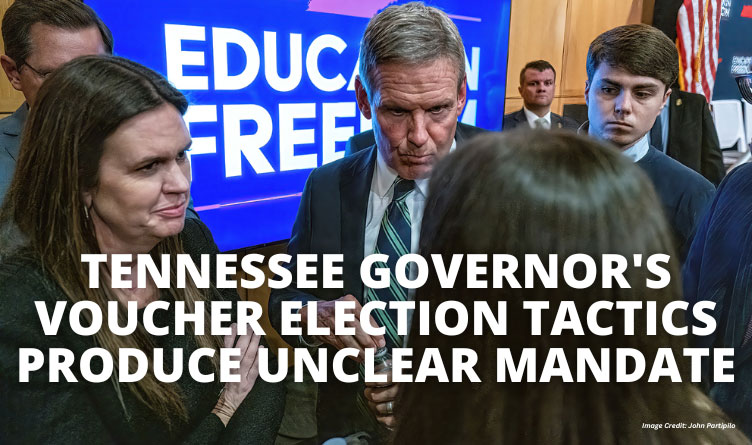Political expert says results were based on variables that changed race to race and indicate no strong support for Gov. Bill Lee’s school voucher plan.
Image: Gov. Bill Lee, accompanied by Arkansas Gov. Sarah Huckabee Sanders, left, at a press conference at which he announced a plan to let parents use public funds for private schools. Image Credit: John Partipilo
By Sam Stockard [The Tennessee Lookout -CC BY-NC-ND 4.0] –
Despite gubernatorial backing and massive independent spending, support for private-school vouchers failed to produce a clear mandate in last week’s Republican primary.
It’s an outcome that could come back to haunt Gov. Bill Lee if he’s banking on the shift of students to private schools to cement his political legacy.

In Williamson County’s District 65 state House race, a pro-voucher political action committee poured nearly $1 million into expenditures for Lee Reeves’ campaign, which Lee backed. Yet Reeves won by only 95 votes, picking up 35% of the total, to defeat County Commissioner Brian Beathard. Reeves will be the favorite to claim the seat being vacated by Republican Rep. Sam Whitson, who opposed Lee’s voucher plan to create a universal program providing $7,000 each for every student in the state to enroll in private schools.
Lee’s endorsement of several pro-voucher candidates was considered unusual at best. He picked a winner in Sumner County where Sen. Ferrell Haile rode some $400,000 in donations from Lt. Gov. Randy McNally’s PAC to defeat Chris Spencer, co-founder of the Sumner County Constitutional Republicans.
But Lee took losses in the race between Sen. Jon Lundberg, the Senate Education Committee chairman who carried the Senate version of the voucher bill and fell to Bristol pharmacist Bobby Harshbarger, and longtime Rep. John Ragan of Oak Ridge, who lost to Rick Scarbrough, a veteran police chief.
The Lundberg defeat is likely to be the governor’s biggest drawback because not only could it be one less vote for private-school vouchers but it could cut into the power of Lt. Gov. Randy McNally as he nears the end of his political career.
MTSU political science professor Kent Syler said the primary results don’t indicate any mandate for the governor’s education initiative.
“It looks like a mixed bag where a lot of different issues were at play and … other variables that changed race to race,” Syler says.

In Senate District 8, the Education Freedom Fund, which was funded by the Club for Growth, spent heavily on Jessie Seal, helping him handily beat veteran Sen. Frank Niceley, a voucher opponent.
The PAC spent north of $3.5 million targeting Lee’s voucher opponents.
Niceley, a Strawberry Plains farmer, who supported private-school voucher legislation during the early 1990s as a House member, changed his tune this year.
Count that as a victory for Lee in his voucher quest.
Lee also picked up a win in East Tennessee’s House District 68 race to replace outgoing Rep. Bryan Richey, who suspended his campaign and was demolished by Tom Hatcher, a voucher proponent, in a separate Senate race.
Lee also won in Clarksville where newcomer Aron Maberry won the primary to replace Republican Curtis Johnson, a moderate old-timer.
The governor took a punch to the chin, though, in Anderson County where Republican Rep. John Ragan of Oak Ridge, a staunch voucher proponent, fell to Scarbrough, a former Clinton police chief.
Tom Stinnett dealt the Lee forces a loss, too, in Blount County, narrowly defeating Nick Bright and Jason Emert, the governor’s pick.
Tennesseans for Student Success and Team Kid PAC claimed a victory in Scarbrough’s win. Yet the organization is sitting on the fence when it comes to private-school vouchers, refusing to say it supports Lee’s plan but claiming victories in eight races for candidates who largely supported vouchers.
A press release from the groups says, “Primary results show Tennesseans don’t want to return to a second-rate education,” explaining they are “celebrating the critical role foundational education policies played” in the election results.
Scarbrough’s website mentions no backing for the governor’s proposal, instead touting endorsements from several school board members.

Similarly, Republican candidate Michele Renaeu, who narrowly defeated House finance committee chairwoman Patsy Hazlewood, says on her website she supports “local control” in education but mentions nothing about vouchers. It’s unclear whether she will jump on the governor’s bandwagon.
Both Lee and former Gov. Bill Haslam endorsed Hazlewood, who voted to add Hamilton County to the state’s education savings account program a year ago, chalking up yet another loss for the Lee Administration.
In short, Lee put a great deal of energy — followed by dark-money resources — into attacking people who don’t support his private-school voucher plan, which is reportedly bankrupting states such as Arizona.
The amount of money spent in this year’s primaries left a stench, while Lee’s tacit approval tainted some of the outcomes.
The governor’s credibility is at stake as the general election arrives in November and the Legislature returns to Nashville in January 2025. By then, the governor might not have much of a bully pulpit left to pass a program running into serious problems nationally and roadblocks in rural Tennessee where lawmakers are leery.


About the Author: Sam Stockard is a veteran Tennessee reporter and editor, having written for the Daily News Journal in Murfreesboro, where he served as lead editor when the paper won an award for being the state’s best Sunday newspaper two years in a row. He has led the Capitol Hill bureau for The Daily Memphian. His awards include Best Single Editorial from the Tennessee Press Association. Follow Stockard on Twitter @StockardSam




5 Responses
Frank Nicely and Michele Reneau are both in favor of REAL school choice, not the b.s. voucher program Bill Lee tried to cram down everyone’s throat this past session.
“REAL school choice” for most middle and lower income parents will only exist when they have the means to pay for alternatives to government schools. That can only be possible on a mass scale when they have a voucher representing at least some of the money devoted to their children’s education from the state in satisfaction of the state’s constitutional responsibility to provide an education for those children.
Let’s pass the best school voucher plan that we can knowing it’s a work in progress that we can improve as time goes by and we sap political power away from the Government School Trust. Why some conservatives want to join the Government School Trust in adamantly opposing ANY voucher plan which will only preserve the Trust’s monopoly continues to be a mystery to me.
‘No Accountability’: Vouchers Wreak Havoc on States
School vouchers are being used mainly by families whose children are already in private school—and state budgets are being drained as a result.
In December 2022, Arizona became the first state in the nation to enact a universal school voucher program.
While it may still be growing, Arizona’s ESA voucher program is also a fiasco. All the promises made over the past year by the law’s most zealous supporters have run aground amid reports detailing the program’s astronomical cost and lax accountability. Voucher laws generally do not require any sort of disclosure from private schools about their finances, how they operate, or how they measure student achievement. Arizona’s is one of the least accountable voucher programs in the nation.
https://www.nea.org/nea-today/all-news-articles/no-accountability-vouchers-wreak-havoc-states
Again, vouchers are a radical departure from what exists, and what exists is a state monopoly that all too often indoctrinates students inro a world-view so that they are well on their way to becoming little Bolsheviks before they even get to college. OK, maybe I exaggerate a bit, but close enough. Every conservative should champion finding an alternative to what exists.
Arizona was first, God bless Arizona for taking the leap. Now we can take Arizona’s experience and improve upon it and make our plan something we can afford. Conservatives always operate under the assumption that good things happen when you give individuals the freedom and responsibility to control their own life and family. We can assume parents want what is best for their children. “Accountability” raises the question, accountable to who. Accountable to the state now gets us back to sort of a hybrid where private/religious schools operate as sort of a public utility like the gas company. NO THANK-YOU. A requirement to report student achievement and school wide achievement on SAT/ACT to current and prospective parents has possibilities.
Breaking up the Government School Trust education monopoly is the goal long sought after by conservatives for obvious reasons. Changing something that has existed for so long with long accumulated political power is a heavy lift but is very much worth doing. It involves trial and error and takes time but I hope all conservative lend their input into accomplishing this task rather than join the Government School Trust and assorted leftists who want to keep students trapped in government schools in finding excuses as to why it can’t be done.
First
Kick the feds out of public education
2nd
Distribute state funds according to student population
3rd
State funds follows the student
4th
No Double Financing
The state funding shall not fund two schools for the same student
5th the state shall not knuckle under to edu.unions and special interest pacs/groups
What is hard about this?